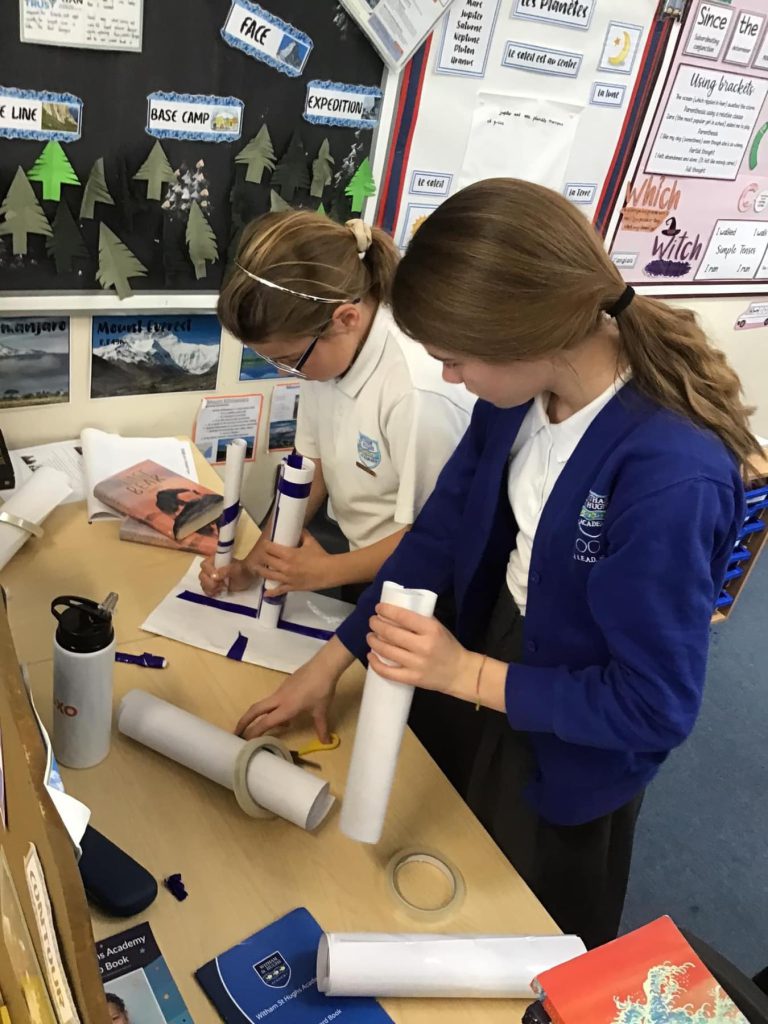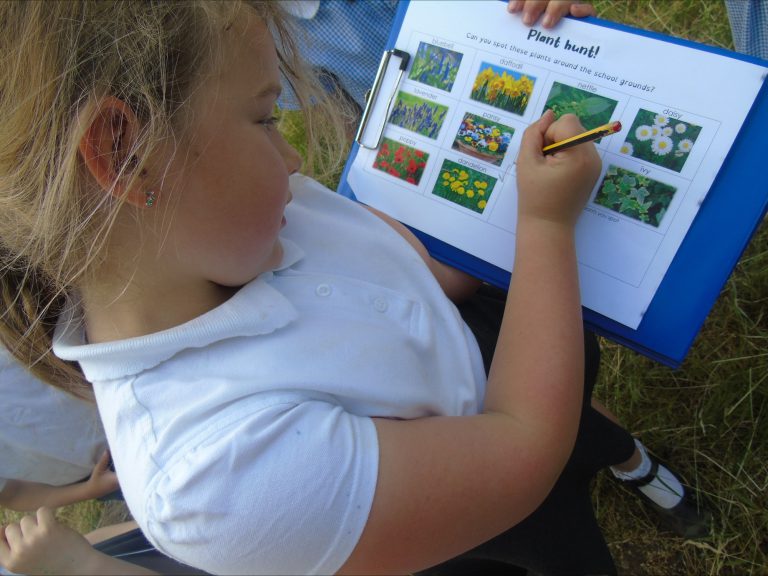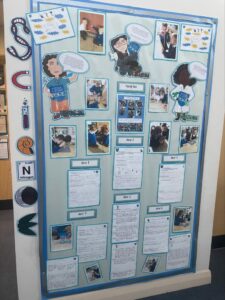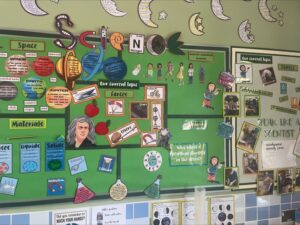
Embarking on the scientific journey at Witham St Hughs Academy is a thrilling exploration of the scientific world as we build our Science capital for all our learners. Students leave our Academy with a deep fascination for scientific inquiry and a strong commitment to the advancement of knowledge.
Throughout their time as budding scientists, they engage in hands-on experiments and investigations that progressively broaden their understanding of the scientific realm. Moreover, they develop a diverse set of scientific skills that will serve them well in their future educational pursuits and endeavours. The principles of investigation are interwoven throughout our science curriculum, guiding children to cultivate an appreciation for the interconnections between cause and effect.

At Witham St Hughs Academy, we are committed to delivering a captivating science education that nurtures inquisitiveness and awe towards the natural world, fostering the development of active and globally aware citizens.
Our approach to science teaching is designed to equip every pupil with knowledge that extends beyond their personal experiences. In our local community, where diversity can be limited, we strive to offer enriching experiences and knowledge that broaden students’ understanding.
The planning of our science curriculum is grounded in the requirements outlined in the National Curriculum, supplemented by valuable insights from esteemed sources like STEM Learning. We particularly focus on incorporating the principles of excellent practice in primary science. Our curriculum is meticulously structured and carefully sequenced, ensuring a clear progression for each year group. To facilitate effective progression, our curriculum is thoughtfully organised across year groups, emphasising clarity and coherence.
Teachers then adapt the framework to meet the individual needs of their students. By having access to this framework, teachers remain well-informed about the existing knowledge and skills students should possess before introducing new scientific concepts. This approach allows them to guide students effectively, ensuring their knowledge and understanding align with the expected standards.
Disciplinary and Substantive Knowledge
We firmly believe that students require a solid foundation in essential scientific knowledge to thrive in their scientific pursuits. These fundamental elements can be broadly categorized into four key areas: scientific concepts, scientific inquiry and investigation, scientific skills and methods, and scientific communication and application. Our curriculum is thoughtfully designed to incorporate each of these aspects at every stage of a pupil’s academic journey, fostering a progressive and sequential development of knowledge and skills.
In addition to this substantive scientific knowledge, it is equally crucial for students to acquire disciplinary knowledge that enables them to understand and engage with the thought processes and learning approaches of scientists. As pupils progress through our Academy, these skills are nurtured, empowering them to formulate their own scientific ideas, opinions, and approaches. To cultivate pupils’ substantive knowledge, our teachers employ subject-specific pedagogy, teaching science in a manner that reflects the practices and mindset of scientists. This approach enables students to learn and think like scientists, fostering a deep understanding and appreciation of the scientific discipline.
Our commitment to excellence in primary science extends to incorporating the principles of STEM (Science, Technology, Engineering, and Mathematics) learning. By integrating these disciplines, we provide pupils with opportunities to explore real-world connections, engage in hands-on experiments, and develop critical thinking and problem-solving skills. Our assessment approach aligns with the TAPs (Teacher Assessment in Primary Science) framework, ensuring accurate and comprehensive evaluation of students’ scientific knowledge and skills.
Through our holistic approach to science education, we strive to empower pupils to become proficient scientists, equipped with both substantive and disciplinary knowledge, ready to excel in their scientific journeys and make meaningful contributions to the scientific community and the world at large.
In our Academy, the teaching of science is a captivating and immersive experience aimed at igniting a sense of wonder and curiosity about the world. Students are provided with abundant first-hand experiences and experiments, and when a physical – hands on approach is not possible, our teaching team employ innovative techniques such as video, thought experiments and use of STEM experts, to bring the science curriculum to life. Throughout the year, pupils delve into compelling topics that allow them to apply their scientific knowledge and think critically; adopting the mind-set of a scientist-, these are tied into scientific jobs.
At Witham St Hughs Academy, we hold high aspirations for all learners in science, and our skilled teachers adapt their methods to ensure that every pupil can access the curriculum, while also providing opportunities for stretching and challenging the most capable individuals.
Teachers regularly assess pupils’ retention of previously taught concepts, structuring lessons to prioritise recap at the beginning and address any misconceptions that students may have.
Through our approach to science education at Witham St Hughs Academy, we aim to inspire a lifelong passion for scientific exploration, nurture critical thinking skills, and ensure that every pupil has the opportunity to excel and thrive in the fascinating world of science

Scientific experiences at Witham St Hughs Academy align with the National Curriculum for Science in the UK, providing students with a comprehensive understanding of key scientific concepts and skills. The curriculum is carefully designed to promote scientific exploration, critical thinking, and a deep appreciation for the natural world.
In the early years, students in Reception engage in hands-on activities to develop their scientific skills and understanding. They explore the properties of materials, investigate changes in the environment, and observe and classify living organisms. These experiences lay the foundation for future scientific learning.
As pupils progress into Key Stage 1, they delve into a range of scientific topics, including plants, animals, everyday materials, and seasonal changes. They learn to make observations, ask questions, and conduct simple experiments to test hypotheses. Pupils also explore the effects of forces and explore different sources of light.
In Key Stage 2, the scientific experiences become more specialised and in-depth. Pupils study topics such as living things and their habitats, properties and changes of materials, Earth and space, and forces and magnets. They develop scientific inquiry skills by planning and conducting investigations, analysing data, and drawing conclusions. Students also learn about the interrelationships between organisms and their environments and explore the Earth’s structure, rocks, and fossils.
At Witham St Hughs Academy, our commitment to the National Curriculum ensures that students receive a well-rounded science education. Through engaging experiments, practical activities, and the development of scientific skills, students become scientifically literate individuals who can confidently apply their knowledge to real-world situations.

You can see our Science curriculum on display in our classrooms where we share our topics- in the corridor where we share our skills in investigations, as well as some other whole-school displays. These are full of our big questions that allow us to really delve into our topics along with our work like a Scientist boards that link our topics to real world jobs.
